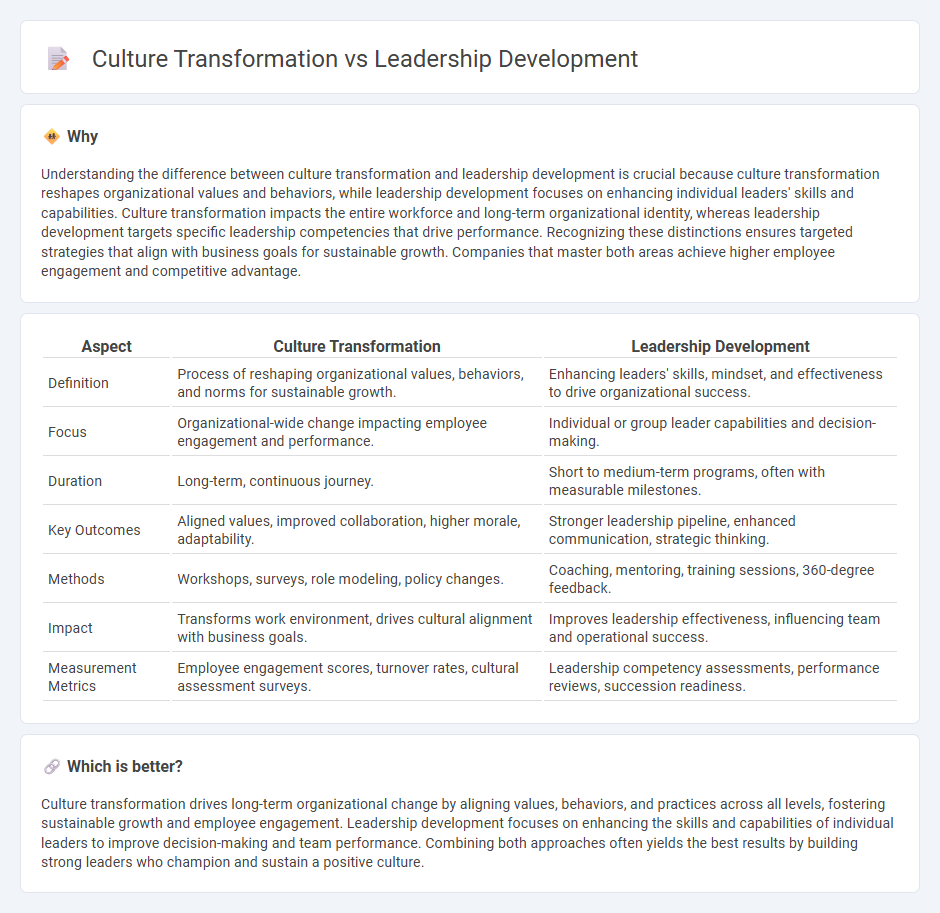
Culture transformation reshapes organizational values, behaviors, and mindsets to drive long-term change, while leadership development focuses on enhancing individual leaders' skills and competencies to improve decision-making and team performance. Both strategies address different but complementary aspects of organizational growth and adaptability in dynamic markets. Discover how integrating culture transformation with leadership development can unlock your organization's full potential.
Why it is important
Understanding the difference between culture transformation and leadership development is crucial because culture transformation reshapes organizational values and behaviors, while leadership development focuses on enhancing individual leaders' skills and capabilities. Culture transformation impacts the entire workforce and long-term organizational identity, whereas leadership development targets specific leadership competencies that drive performance. Recognizing these distinctions ensures targeted strategies that align with business goals for sustainable growth. Companies that master both areas achieve higher employee engagement and competitive advantage.
Comparison Table
| Aspect | Culture Transformation | Leadership Development |
|---|---|---|
| Definition | Process of reshaping organizational values, behaviors, and norms for sustainable growth. | Enhancing leaders' skills, mindset, and effectiveness to drive organizational success. |
| Focus | Organizational-wide change impacting employee engagement and performance. | Individual or group leader capabilities and decision-making. |
| Duration | Long-term, continuous journey. | Short to medium-term programs, often with measurable milestones. |
| Key Outcomes | Aligned values, improved collaboration, higher morale, adaptability. | Stronger leadership pipeline, enhanced communication, strategic thinking. |
| Methods | Workshops, surveys, role modeling, policy changes. | Coaching, mentoring, training sessions, 360-degree feedback. |
| Impact | Transforms work environment, drives cultural alignment with business goals. | Improves leadership effectiveness, influencing team and operational success. |
| Measurement Metrics | Employee engagement scores, turnover rates, cultural assessment surveys. | Leadership competency assessments, performance reviews, succession readiness. |
Which is better?
Culture transformation drives long-term organizational change by aligning values, behaviors, and practices across all levels, fostering sustainable growth and employee engagement. Leadership development focuses on enhancing the skills and capabilities of individual leaders to improve decision-making and team performance. Combining both approaches often yields the best results by building strong leaders who champion and sustain a positive culture.
Connection
Culture transformation drives organizational change by reshaping core values and behaviors, while leadership development equips leaders with the skills to guide and sustain this shift effectively. Effective leadership fosters an environment of trust and collaboration, essential for embedding new cultural norms. The synergy between culture transformation and leadership development ensures long-term organizational resilience and competitive advantage.
Key Terms
**Leadership Development:**
Leadership development emphasizes enhancing individual skills, emotional intelligence, and strategic decision-making abilities to drive organizational success. It prioritizes tailored training programs, mentorship, and performance feedback loops that build future-ready leaders aligned with company goals. Discover how effective leadership development can reshape your organization's growth trajectory and competitive edge.
Coaching
Leadership development centers on enhancing individual skills and competencies through targeted coaching to improve decision-making, emotional intelligence, and team management. Culture transformation involves reshaping organizational values and behaviors, using coaching to align employees with new norms and foster collaboration. Explore how integrating coaching strategies can drive both leadership growth and cultural change in your organization.
Succession Planning
Leadership development enhances individual capabilities essential for effective succession planning by preparing high-potential leaders with critical decision-making and strategic skills. Culture transformation fosters an organizational environment that supports continuous learning, adaptability, and the seamless integration of new leaders, ensuring long-term succession success. Explore more to understand how aligning these approaches optimizes succession planning outcomes.
Source and External Links
How to Create a Successful Leadership Development Program - This guide outlines a step-by-step process for designing leadership development programs focused on aligning learning outcomes with key business priorities and measuring impact through continuous feedback and evaluation.
10 Key Leadership Development Areas (With Examples) | Indeed.com - Leadership development focuses on improving specific skills such as decision-making, communication, mentoring, and trust-building through targeted activities to grow stronger leaders.
Leadership Development Meaning & Importance - peopleHum - Leadership development enhances an individual's ability to lead by using methods like coaching and mentoring, including reverse mentoring to bridge generational gaps and prepare future leaders effectively.
 dowidth.com
dowidth.com